#utena translations
Explore tagged Tumblr posts
Text
It's May, 1997. Revolutionary Girl Utena is Upon Us.
You are an Utena addict. You watch every episode the day it airs. You've raided your local Japanese anime store. And guess what? THE NEW ISSUES SURE ARE EASY TO FIND WITH OUR GIRLIES ON THE COVERS:


(It's a little lame that Animedia didn't put them on the cover, but they did give us this spread, thanks to @hotwaterandmilk! https://hotwaterandmilk.tumblr.com/post/71621932377
Let's see what we've got!!!
Newtype's beautiful six page spread includes an interview with Saito and Ikuhara that has been translated by Tuxedo Unmasked! I also scan, as always, the cover, ToC, episode summaries, ratings, and any adverts or fanart I find. Did you know the OP/ED singles drop this month??? Lucky for you you can grab them here. ;)

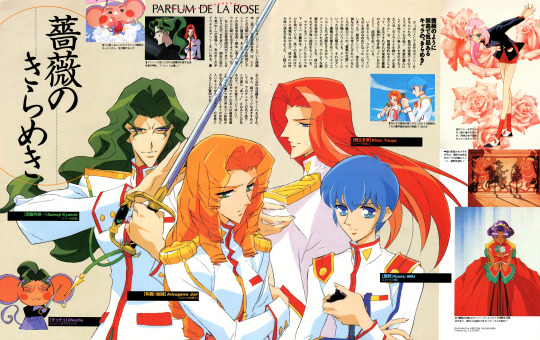

But the wealth? That's in Animage's May 1997 Issue, which not only have we scanned....we've translated!!! Spring '97's Revolutionary Announcement!! That's right it's MASSIVE. But you already clicked read more. Here's your chance. :)



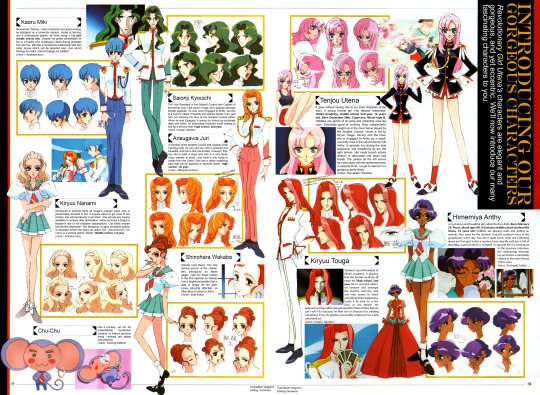

You're all caught up on the newest information, and you are ready for the next episode!!! (I know I keep saying May, but shut up) LET'S WATCH EPISODE 5, AIRING TODAY, APRIL 30, 1997
The Sunlit Garden ~ Finale
#utena#revolutionary girl utena#utena meta#empty movement#newtype#animage#utena translations#utena watch#ikuhara#saito#yoji enokido#character designs#rgu#sku#shoujo kakumei utena
182 notes
·
View notes
Text
I do sort of wish western anime fans would analyze anime and manga from a framework of japanese historical and cultural context. Specifically a lot of works from the 90s being influenced by the general aimlessness and ennui that a lot of people were experiencing due to the burst in the bubble economy and the national trauma caused by the sarin terrorist attack. I think in interacting with media that’s not local to our sociocultural/sociopolitical sphere it’s easy to forget that it’s influenced and shaped by the same kinds of factors that influence media within our own cultural dome and there ends up being this baseline misalignment of perception between the causative elements of a narrative and viewer interpretation of those elements. It’s a form of death of the author that i think, in some measure, hinders our ability to fully understand/come to terms with creator intent and the full scope of a work’s merits
#exilley's diary#this is about utena btw like. yeah its feminist and a coming of age horror story but also#it was in part ikuhara’s response to the changes he observed in the corporate anime industry and an attempt to subvert those trends#it doesnt really help that i feel certain aspects of the show are filtered through translation and certain cultural emphasises are lost#like for instance. the blood type symbolism. or wakaba’s gestures with making packed lunches#theyre incredibly japanese expressions of conventional gender roles that non-japanese audiences might not fully resonate with
27K notes
·
View notes
Text
Gendered pronouns in Japanese vs English
In Revolutionary Girl Utena, the main character Utena is a girl (it says so in the title), but very conspicuously uses the masculine first person pronoun 僕 (boku) and dresses in (a variation of) the boys school uniform. Utena's gender, and gender in general, is a core theme of the work. And yet, I haven’t seen a single translation or analysis post where anyone considers using anything other than she/her for Utena when speaking of her in English. This made me wonder: how does one’s choice of pronouns in Japanese correspond to what one’s preferred pronouns would be in English?

There are 3 main differences between gendered pronouns in Japanese vs English
Japanese pronouns are used to refer to yourself (first-person), while English pronouns are used to refer to others (third-person)
The Japanese pronoun you use will differ based on context
Japanese pronouns signify more than just gender
Let’s look at each of these differences in turn and how these differences might lead to a seeming incongruity between one’s Japanese pronoun choice and one’s English pronoun choice (such as the 僕 (boku) vs she/her discrepancy with Utena).
Part 1: First-person vs third-person
While Japanese does technically have gendered third person pronouns (彼、彼女) they are used infrequently¹ and have much less cultural importance placed on them than English third person pronouns. Therefore, I would argue that the cultural equivalent of the gender-signifying third-person pronoun in English is the Japanese first-person pronoun. Much like English “pronouns in bio”, Japanese first-person pronoun choice is considered an expression of identity.
Japanese pronouns are used exclusively to refer to yourself, and therefore a speaker can change the pronoun they’re using for themself on a whim, sometimes mid-conversation, without it being much of an incident. Meanwhile in English, Marquis Bey argues that “Pronouns are like tiny vessels of verification that others are picking up what you are putting down” (2021). By having others use them and externally verify the internal truth of one’s gender, English pronouns, I believe, are seen as more truthful, less frivolous, than Japanese pronouns. They are seen as signifying an objective truth of the referent’s gender; if not objective then at least socially agreed-upon, while Japanese pronouns only signify how the subject feels at this particular moment �� purely subjective.
Part 2: Context dependent pronoun use
Japanese speakers often don’t use just one pronoun. As you can see in the below chart, a young man using 俺 (ore) among friends might use 私 (watashi) or 自分 (jibun) when speaking to a teacher. This complicates the idea that these pronouns are gendered, because their gendering depends heavily on context. A man using 私 (watashi) to a teacher is gender-conforming, a man using 私 (watashi) while drinking with friends is gender-non-conforming. Again, this reinforces the relative instability of Japanese pronoun choice, and distances it from gender.

Part 3: Signifying more than gender
English pronouns signify little besides the gender of the antecedent. Because of this, pronouns in English have come to be a shorthand for expressing one’s own gender experience - they reflect an internal gendered truth. However, Japanese pronoun choice doesn’t reflect an “internal truth” of gender. It can signify multiple aspects of your self - gender, sexuality, personality.
For example, 僕 (boku) is used by gay men to communicate that they are bottoms, contrasted with the use of 俺 (ore) by tops. 僕 (boku) may also be used by softer, academic men and boys (in casual contexts - note that many men use 僕 (boku) in more formal contexts) as a personality signifier - maybe to communicate something as simplistic as “I’m not the kind of guy who’s into sports.” 俺 (ore) could be used by a butch lesbian who still strongly identifies as a woman, in order to signify sexuality and an assertive personality. 私 (watashi) may be used by people of all genders to convey professionalism. The list goes on.
I believe this is what’s happening with Utena - she is signifying her rebellion against traditional feminine gender roles with her use of 僕 (boku), but as part of this rebellion, she necessarily must still be a girl. Rather than saying “girls don’t use boku, so I’m not a girl”, her pronoun choice is saying “your conception of femininity is bullshit, girls can use boku too”.

Through translation, gendered assumptions need to be made, sometimes about real people. Remember that he/they, she/her, they/them are purely English linguistic constructs, and don’t correspond directly to one’s gender, just as they don’t correspond directly to the Japanese pronouns one might use. Imagine a scenario where you are translating a news story about a Japanese genderqueer person. The most ethical way to determine what pronouns they would prefer would be to get in contact with them and ask them, right? But what if they don’t speak English? Are you going to have to teach them English, and the nuances of English pronoun choice, before you can translate the piece? That would be ridiculous! It’s simply not a viable option². So you must make a gendered assumption based on all the factors - their Japanese pronoun use (context dependent!), their clothing, the way they present their body, their speech patterns, etc.
If translation is about rewriting the text as if it were originally in the target language, you must also rewrite the gender of those people and characters in the translation. The question you must ask yourself is: How does their gender presentation, which has been tailored to a Japanese-language understanding of gender, correspond to an equivalent English-language understanding of gender? This is an incredibly fraught decision, but nonetheless a necessary one. It’s an unsatisfying dilemma, and one that poignantly exposes the fickle, unstable, culture-dependent nature of gender.

Notes and References
¹ Usually in Japanese, speakers use the person’s name directly to address someone in second or third person
² And has colonialist undertones as a solution if you ask me - “You need to pick English pronouns! You ought to understand your gender through our language!”
Bey, Marquis— 2021 Re: [No Subject]—On Nonbinary Gender
Rose divider taken from this post
#langblr#japanese#japanese language#language#language learning#linguistics#learning japanese#utena#revolutionary girl utena#shojo kakumei utena#rgu#sku#gender#transgender#nonbinary#trans#official blog post#translation#media analysis
2K notes
·
View notes
Text

"She opened her eyes, lifted the lid from her coffin, sat up, and was alive again" (Grimm, 1857/2005)
#kanae ohtori#revolutionary girl utena#rgu#revolutionary girl utena fanart#my art#text from the seventh and final eddition of the Grimm's fairytales from 1957#translated by D.L. Ashliman from 2002-2005#comics#typo but im too lazy to delete my other tags#its 1857 not 1957#comic
2K notes
·
View notes
Text
Ikuhara would later tell Nagahama he had issues with how Utena's title was translated in English. “[Ikuhara] told me it's not about a girl who causes a revolution. She's not Joan of Arc,” Nagahama said. “It's about a girl's revolution. All girls' revolutions. It's about a freeing of a set destiny and whatever that path is. If you look at the title in Japanese, it's not 'Kakumei Shojo,' it's 'Shojo Kakumei.' The translation should be Girls' Revolution Utena.”
from this interview:
172 notes
·
View notes
Text
there are several different translations of rgu and sometimes they make sentences have completely different meanings between them and it drives me a little bit crazy


like this moment in the first episode.. these things are both accurate insights into utena's character and motivations but they're also completely different from each other. idk which is more accurate to the original japanese, maybe it's a sentence that can mean both depending on context or something?
#utena#m#i feel like a lot of my analyses are based on specific wording in the scenes i'm talking about which may actually be completely different#in other translations and therefore kind of invalidating what i'm saying? because how would i know if i have the most accurate one
235 notes
·
View notes
Text
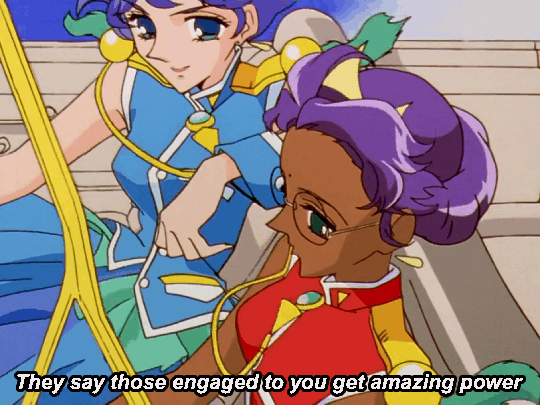
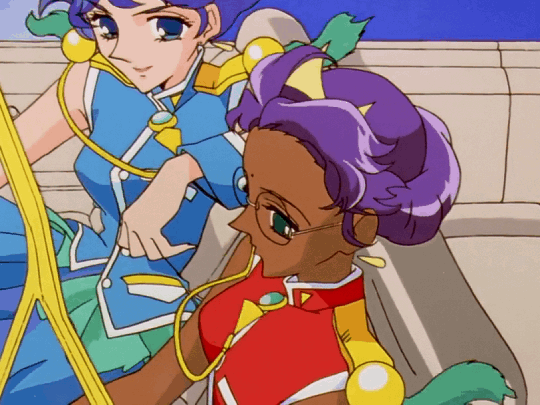


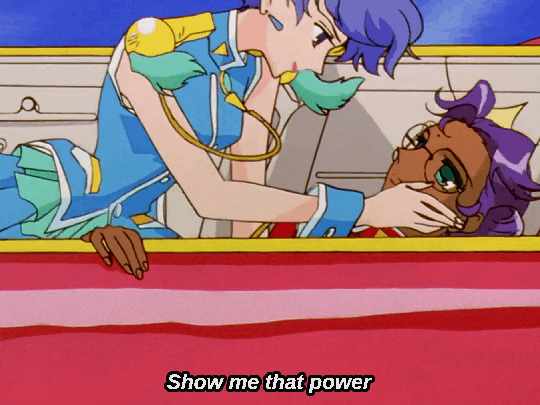


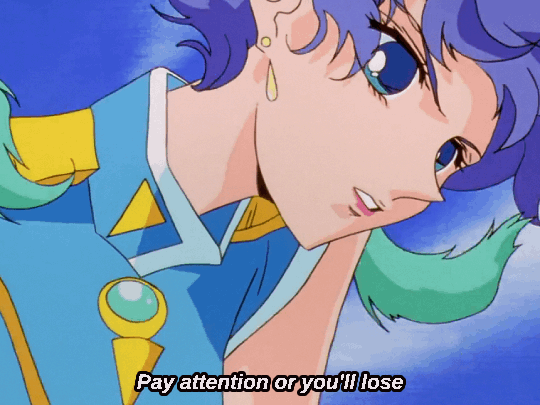
Revolutionary Girl Utena 26 - Miki's Nest Box (The Sunlit Garden Arranged)
#revolutionary girl utena#shoujo kakumei utena#bits#this is one of my favorite utena scenes ever#as much as I tried my best with this set#there's no substitution for the actual scene itself#I wish I could have found a way to translate the castle lights but still images like that don't translate well to gif format unfortunately#also everybody go and look at anthy's weird hand
484 notes
·
View notes
Text
youtube
This came up on youtube so I was able to relisten and confirm without having to replay the game- Nanami, who famously did not know the english word cow and so did not know that a cowbell is a bell for cows, knows the English word "lesbian". This implies so much.
#nanami kiryuu#juri arisugawa#that moment when nanami realized outing juri would end with her dead#revolutionary girl utena#nev plays the utena game#and yeah she was translating with the#no interest in boys thing#not being redundant#Youtube#lEsBiAN daaaaatte#i mean i'm sure it's a loan word but still. not a common enough one in the 90s she didn't have to translate#apparently.
231 notes
·
View notes
Text

you gotta watch utena it has found family and queer rep
#helio.txt#someone translated enokido's episode commentary#and this is the first thing I thought of when someone mentioned this#revolutionary girl utena#anthy himemiya
49 notes
·
View notes
Text




"Forget me not" from Epee by Rose Revue. Scans courtesy of the Empty Movement.
I'm an amateur translator still learning Japanese, so please take my translations with a grain of salt!
#mikage souji#mamiya chida#chida mamiya#souji mikage#revolutionary girl utena#shoujo kakumei utena#my translations#what if i started practicing by translating old utena doujinshi. lol
56 notes
·
View notes
Text

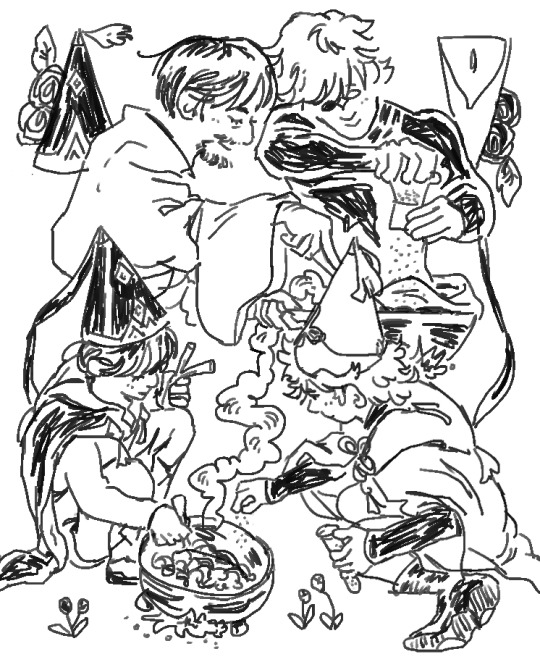
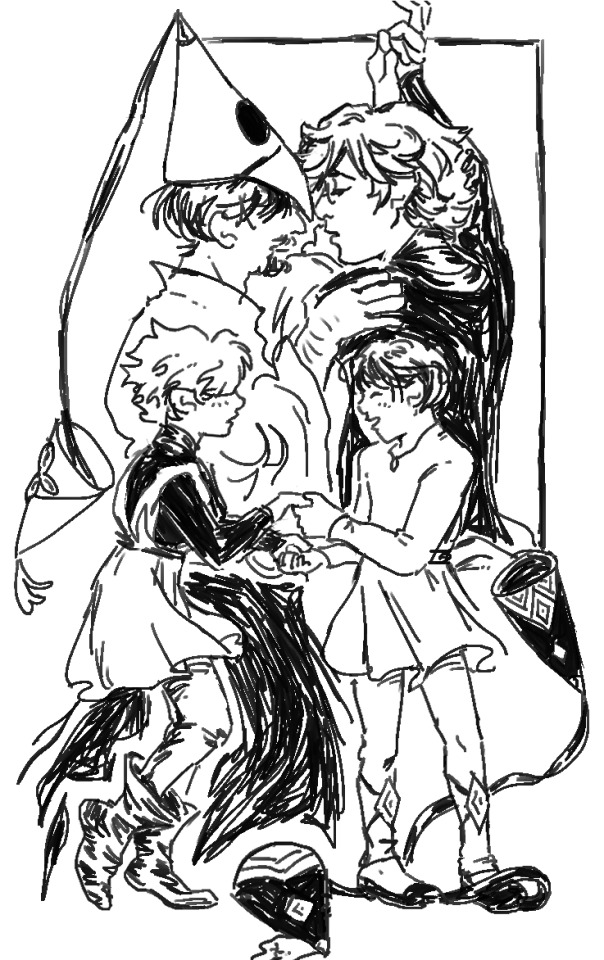
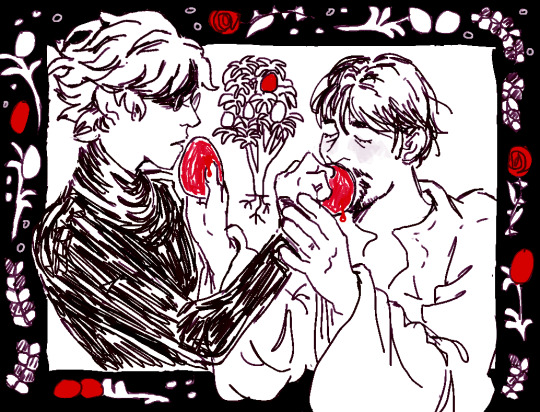
i wanted to put these four together chatting, cooking, dancing, and trust
#witch hat tag#orufrey#sorry for repost of 3 of these images the 4th is new.#based on kitchen chapter 10 and all the emotions that a COOKING SPINOFF gives me. it looks uh. weird. to me. now#but i understand what i mean. always. i like that art can be a way of capturing that for you (and writing)#secrets and food and the one dance we've danced our whole lives and The mountain apple - your heart - the trust i have for you#“If you're the one saying it then it must be true” no offence but yet again official translation chose something paltry compared to that#What if i would die first before i would poison you but what if your trust in me is killing us#What if you're the one who should be trusted wholeheartedly yet still I'm the one who holds back? Who does not take the apple?#What if this is SO evocative of yet so different to the cantarella scene in utena and cai loses their marbles for real this time#drawing wine drops from the apples makes it look like the snow white apple. i cant take it#a week (or 4 days) of randomly trying to be more intuitive with composition or..idk. this weird sloopy brush is good for that. Sloopy i say
190 notes
·
View notes
Text
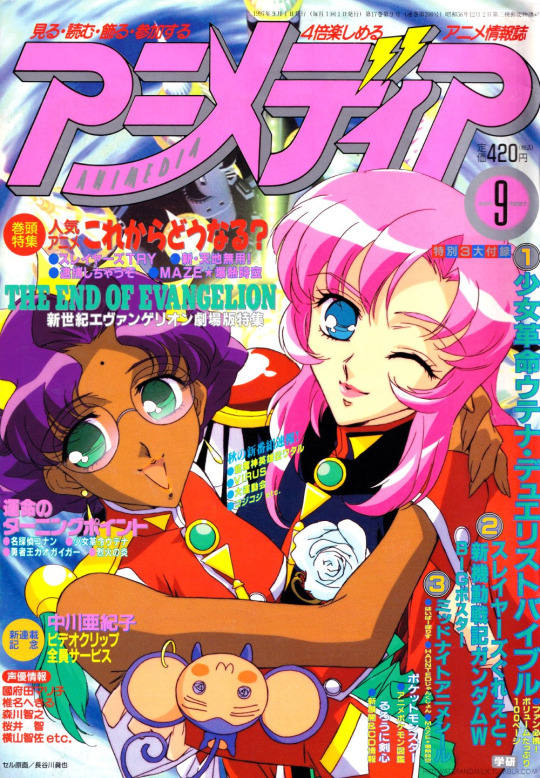
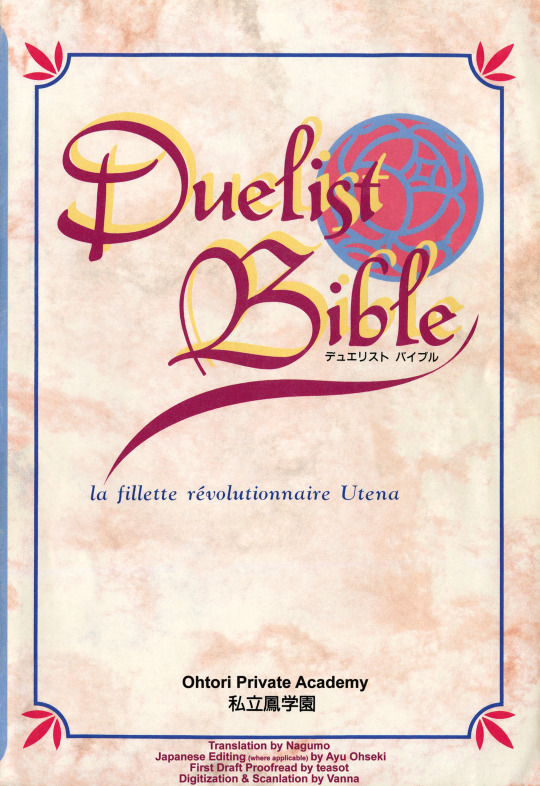
GOGAI, GOGAI!!! COME GET UTENA KIBBLES
It's September 3rd. It's 1997. Princess Diana just died, and that's very important to lots of people. You, however, are chewing your nails to nubs waiting for the climax of Revolutionary Girl Utena's Black Rose Saga. It's going to air today.
But like any good fan, you're already one step ahead, because you've spent the last couple days thumbing through Animedia's September issue supplemental, the 100 page Duelist Bible. Strangely, it appears to be in English??? Wow! Thanks Nagumo for translating, Ayu Ohseki for Japanese editing, teasot for proofreading, and ME, FUCKIN' VANNA, for scanning and scanlating this massive booklet!
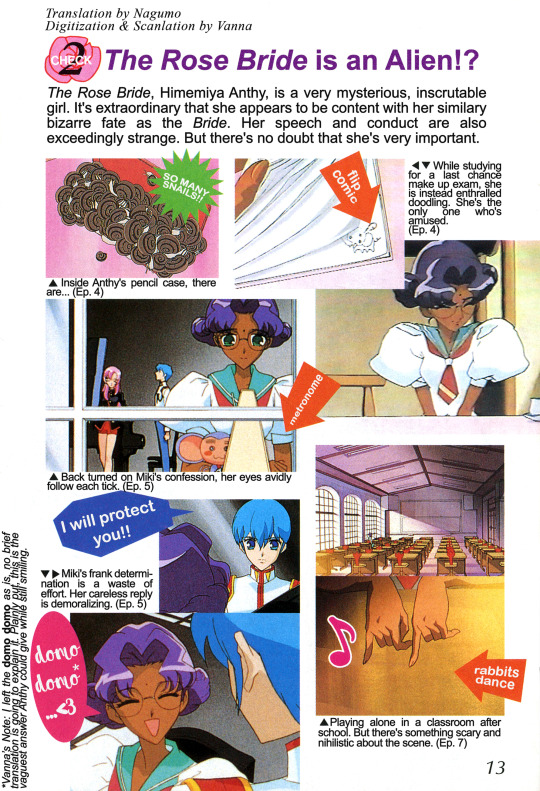
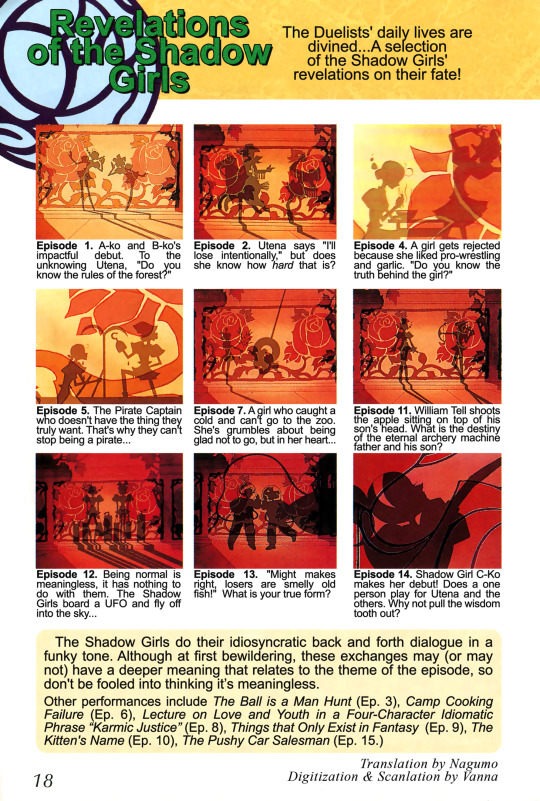
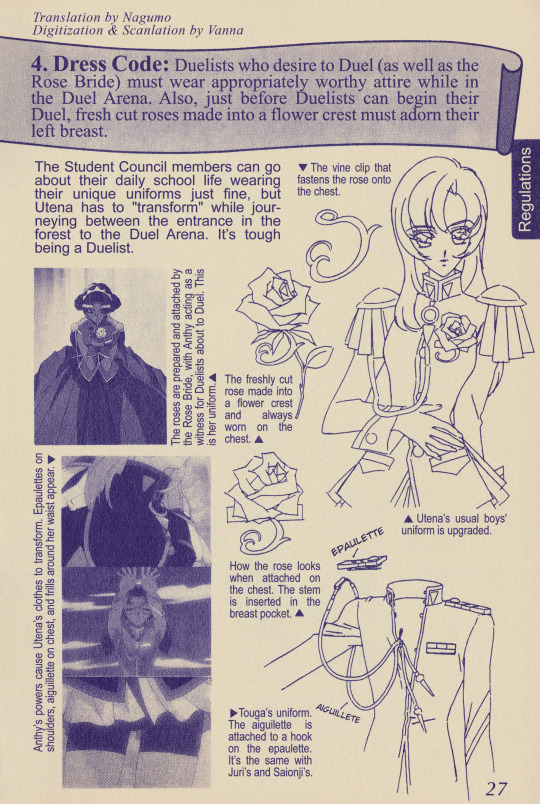

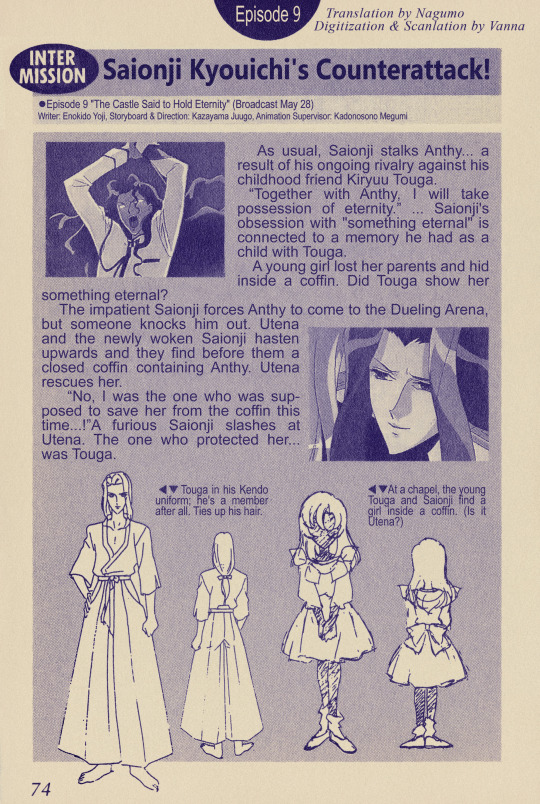
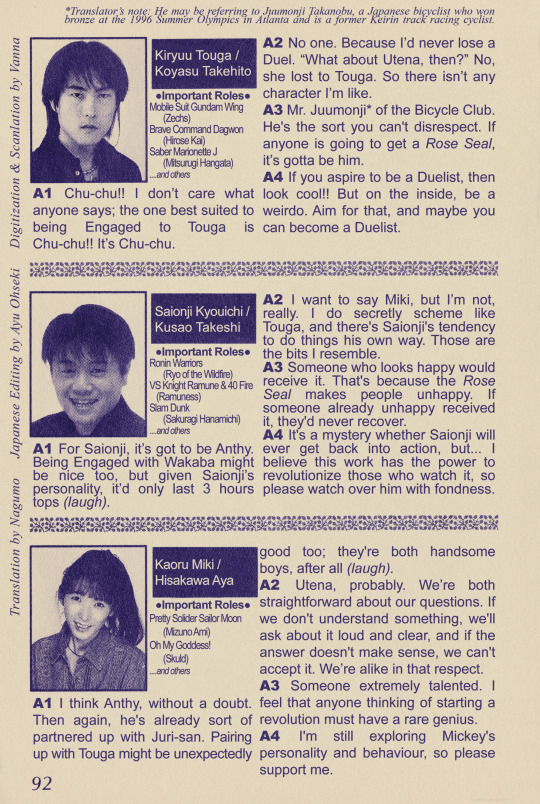
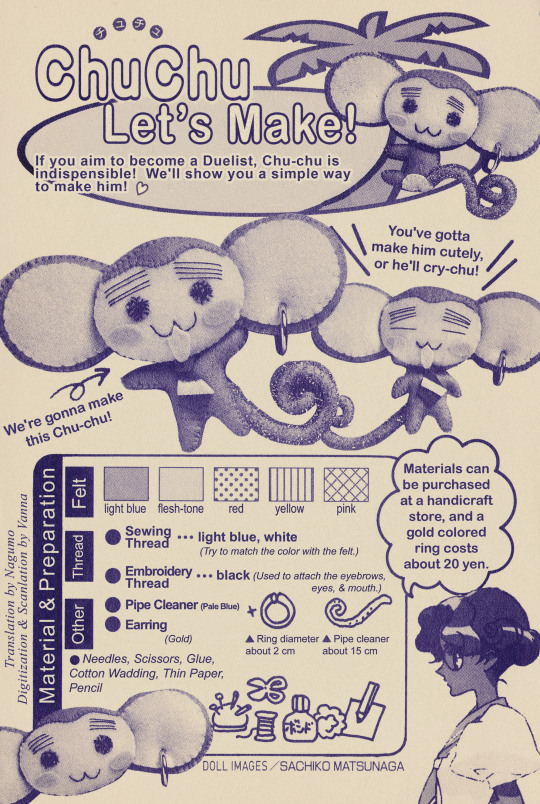
We've got duel summaries! We've got character design sheets! We've got a school directory! We've got THE DUEL RULES. We've got cast interviews! WE'VE GOT THAT CHU-CHU DOLL CRAFT GUIDE. Check it ALL out here, in the Something Eternal Bibliothèque! You can flip through it page by page here, or you'll also find on the page a link to a PDF version for your at home viewing/archiving needs!!
This gargantuan tome really gets it across that in 1997, you didn't have a fandom wiki or on demand viewing. If you didn't catch and record the episodes, a booklet like this becomes a critical tool for keeping track of everything that's happened up to now, and is also a way for the series creators to tap fans on the shoulder and draw attention to details they want seen but not explained in the show directly. For example, this drops at the close of the BRS, but points out Touga's sword isn't the same in Keiko's duel and in the opening sequence. A thing we don't see cashed in until MUCH later!
This has been a true and absurd labor of love on my part. I even rescanned the booklet from my originals because their quality (decades old lmao) was not worth scanlating. This took a ludicrous amount of time, and has been a main project of mine for over a year now!! I'm so happy to have gotten it done in time for the Something Eternal Watch-Along thread, and I really really hope everyone finds something cool and interesting about it! The really cool thing is this now completes the set of magazine supplementals by the big three magazines made for Utena during its run. We now have fully scanlated this, as well as Animage's June Utena Dossier, and Newtype's November Utena? (Oh My!) UTENA! Take a stroll through memory lane, be they yours or someone else's!
As always, if you like this kind of content, consider supporting us on Patreon! Especially right now, a holy grail acquisition is in the works that I will bleed to share with y'all. More on that later, lmao.
Revolutionize the World! Love, Vanna
#revolutionary girl utena#rgu#sku#utena meta#empty movement#utena translation#anime#animage#anime history#animedia#newtype#anime archiving#anime translation#utena#anthy
674 notes
·
View notes
Text
i feel like almost everything in utena has sort of already been extensively discussed in the last two (almost three) decades of utena's existence (not that there aren't new interpretations to be made, there always are) besides black rose arc (mikage+mamiya+tokiko). which is why they're so much fun to think about. i think the need to read between the lines makes it unfortunately easy to misunderstand or look past obvious stuff if you don't pay attention, but to me it's always been really obvious that mikage's arc is a literal representation of the erasure of queerness in ohtori (society?) by akio/everything he represents. and that's so fucking tragic! nemuro was never able to find a name for his desires. he lived and died as a puppet in the shadows.
#rgu#i think sadly that trigger warning list that people always passed around kind of stunted discussion bc of the assumptions it made#like. i think its okay to say that mikage/nemuro was always in love with mamiya and not tokiko#not that its impossible to interpret him as bisexual (similar to how people see utena as bisexual)#but his love for mamiya is what changed his life (same for utena/her meeting anthy)#one scene i never see people bring up is how#at one point mikage says that attaining eternity wouldn't even make 'her' happy#and then akio questions '''her'' you say?'#the only reason mikage thinks attaining eternity wouldnt even make 'her' i.e 'tokiko' happy is because he just had a conversation#with mamiya where he admitted the whole endeavor was making him unhappy#if anything it would have made tokiko happy to attain eternity and forever preserve her brother like a dead flower#which is what akio does with anthy! so fucked!#ALSO another thing#is that mikage sees utena as tokiko returned#just like how utena meets 'dios' - returned as akio#he claims he will finally beat tokiko - in this place (the dueling arena) - which is kind of foreshadowing utena fighting akio?????#anthy!mamiya says to mikage in the black rose musical:#“You can’t win against her. You will eternally lose to my sister who dwells in your memories.”#or “You will never beat my sister; who dwells in your memories.” in the nozomient translation#which makes so much sense because anthy couldn't believe utena could win against akio either#god i could literally keep going#by read between the lines i mean like how akio actively tries to lie to the audience by saying things like#'mamiya was created for you out of your lingering attachment to tokiko'#of course nemuro/mikage being gay isn't all there is to him bc like always everything in utena has 1000 layers#really love the general theme of becoming static and unchanged forever bc of our attachment to nostalgia/memories/eternity#(re: can't grow up)#tho in mikages case he is literally just a ghost summoned by akio. which the utena sega saturn vn confirms#also definitely people talk about black rose arc (i.e me right now) but i feel like the majority of the fandom kind of side steps it#on tumblr specifically at least?? im not on the fansite forums or discord#rgu meta
38 notes
·
View notes
Text
Fansub Release + Analysis of Utena Ep 14
This is a big one!!

My fansub release posts aren't usually like this, but this episode is so jam packed with stuff I want to talk about that I had to write my translation notes as a series of essays. It's longer than usual so strap in!
First, a word on “The Mikage Seminar”
I’ve always found the translation “the Mikage Seminar” very strange. In English, a seminar is an event — a lecture. Yet “the Mikage Seminar” is discussed as though it’s not a recurring lecture, but a society or a school of therapy, or a cult (like scientology). In fact I did a bit of reading about scientology to try and find an alternative translation, and discovered that the origins of scientology, namely a set of ideas and practices called Dianetics, bears a lot of similarities to “the Mikage Seminar”. Both involve a type of therapy where one person looks into their mind and talks to an “auditor”.
The auditor coaxes the preclear to recall as much as possible. — Wikipedia
This in particular stood out to me! Mikage often says 「深く。もっと深く」 during his interviews (”Deeper. Dig deeper.”).
The Japanese word ゼミナール doesn’t actually come from the English “seminar” but the German “Seminar” (capitalised). According to Wikipedia, in Germany, and often in Japan, Seminar/ゼミナール is used to refer to a university course that includes a thesis project. So ゼミナール refers to a course of learning, rather than a talk or lecture. And it would make a lot of sense to call a system like Dianetics a “course”. Almost like a “course” of medicine — a “course” of psychological practices that you can join but never complete.
So it would make sense to translate it as “the Mikage Course”. But “course” has more meanings in English than just this, and in the context of a university this makes it sound more like a mundane teaching course. So I tried some other words: the Mikage Sessions, the Mikage Method, Mikage Psychotherapy, Mikage Therapy, the Mikage Movement. None seemed quite right. Until I remembered this post. ゼミナール is a foreign word in Japanese, why not find a foreign word for the translation? And so I settled on this:
The Mikage Seminarium, AKA The Society of the Black Rose…
Seminarium is Latin, and is where both the German and English derive seminar from. Its original meaning is “seed plot”, but it’s also just the Polish word for seminar. I really like how the Latin makes its meaning ambiguous — it kind of sounds like a location, kind of sounds like a society, and kind of sounds like a learning course. Because it is all of these things.


Anthy: では、香苗さん。失礼します。 Kanae: ね、あたしの事、お姉さんって呼んでいいのよ。もうすぐわたしはあなたの本当のお姉さんになるんだから。
A more literal translation:
Anthy: Thank you for having us, Kanae-san. Kanae: Please… you can just call me “sister”. I’m going to be your real sister soon enough anyway.
The translation I ended up going with:
Anthy: Thank you for having us, Miss Ohtori. Kanae: Please... you can just call me Kanae. We're going to be family soon. There's no need for the formalities.
Japanese honorifics strike again!
In English, sisters-in-law don’t ask to be called “sister”. That would be super weird in most scenarios, and this scene is trying to evoke a particular familiar feeling of closing a distance gap in a relationship. The audience is meant to relate. Changing how Anthy addresses Kanae was pivotal to this scene working properly.


わかりました。あなたは世界を革命するしかないでしょ。
I understand. Your only choice is to force the world to change around you.
This line is translated as “Your only choice is to revolutionise the world” by basically every other translation. The reason is clear — the Japanese is the same as when Utena pulls the sword out of Anthy, or when any of the other characters talk about “revolutionising the world”. However, in this context, I don’t like it. The nuance of the English phrase is quite different to the Japanese phrase. In English, it’s often used to describe new commercial products: “This new device will revolutionise the world!” It comes with an implied “for the better”, but has used to describe technological developments so unexciting that it can also feel hollow. When the student council talk of revolutionising the world, they sound like revolutionaries — the context makes it work. But in this context, it comes out of nowhere and doesn’t have any of that fervour, which makes it sound hollow and flaccid when it should sound sinister and manipulative.
I think a pervading throughline for all the Black Rose duelists is that they see their problems as caused by other people, with themselves being blameless. Rather than change how they approach their situation, Mikage tells them they’re in the right.
Your behaviour will set you down a path. If that path leads to your goals, well done! However, if your path does not lead to your goals, there’s only two ways you can achieve them.

The first is to change your behaviour so that it does align with your goals. The second, impossible way, is for the rest of the world to change such that your current path DOES end up leading to your goals. This second way is not possible in the real world. But it is possible in Utena.

Also I’ll just leave this here: “around you” → “revolve” → “revolution” 👀
Kanae tried to build a relationship with Anthy in a passive, non-confrontational, extremely Japanese way — the way she has been taught to behave, the “proper” way, a mechanical following of the social scripts. We don’t see a lot of their relationship, but the way she behaved and spoke of behaving towards Anthy is very very similar to the way my Japanese grandmother has behaved towards my and my brother’s partners.
It was unthinkable to her to change this pattern of behaviour. Her only choice was to change Anthy, change the rest of the world, so that her behaviour would lead to the outcomes she wants. You could describe this forceful bending of reality to be “revolutionising the world”.


この黒薔薇のある限り、私はこれから嘘の私を演じなくて住む。
As long as I have this Black Rose, I'm free from the lie I was living before.
Besides gender, growing up, and resisting change (which exist as separate themes but also all intertwine as one), another major theme present in Utena is the self and subjective reality. The self is explored within those first major three themes, but also in terms of how the self dictates reality with the Black Rose duellists.
Black Rose Kanae says that her past self was a lie.
It reminds me of all the times when I’ve been going through a personal trial and I’ve looked back on my past self and thought “How naive I was. I understand things better now.” And then after a while I realise I was wrong, and my first self was more right. And then later still, maybe I re-realise that the second self was more right! And so on! The reality of truth (or to use Kanae’s language, “lies”) is so subjective.
Who dictates knowledge production? Who decides what is true; what is valid knowledge? This is a question of sociology - and at the moment that answer is "science does, kinda". But science and academic systems are supported by capitalist structures and tainted by capitalistic incentives — needing to be published in a journal, issues of replicability, the barrier to entry into academia in the first place, etc, etc. In the future we may find our current way of organising knowledge to be archaic and primitive in the same way we look back at medieval scholars.
But what about organising self-knowledge? Knowledge where the only one who can really decide what is true is yourself. And the only one that can decide what yourself even IS is yourself. I feel like I have looked back on my old ways of conceptualising myself many times (not even counting the gender-based revelations) and thought it primitive and archaic, and NOW I truly understand who I am and how to think of myself and how my thoughts interact with my other thoughts. But I have no doubt that I’ll look back on this current self of mine and reject their way of thinking too.
After their heart is replaced by the Black Rose, the duellists themselves frame this change as a moment of self realisation, of clarity. Once the rose is inside them, they wake up from themselves, like I have countless times. Kanae says herself, “This is the true me.” Honestly, I don’t doubt it. I think that version of Kanae was her true self at that moment, given the things influencing her. Being brainwashed doesn’t make you less of a person, or less yourself. It just makes you organise your reality differently.


心を凍結させて作っただけの間に合わせのデュエリストでは、彼女は破れないな。
We won't be able to defeat her by simply freezing someone's heart and forcing them to duel.
Anya and I discussed this in depth. I originally translated 心 as “mind”, because that was the first thing that popped into my head and I thought that was the simple part of the translation. However, Anya pointed out that it didn’t make sense with the themes of self and subjective reality, and I strongly agreed, so I changed it to “heart” instead.
Anya suggested “conscious mind” instead of “heart” but I think heart is more accurate. 心 (kokoro) can mean heart or mind in Japanese (I find it interesting that those two things are portrayed as opposites in English), and that kanji is found in the word for biological heart, 心臓 (shinzou). When they say of the Black Rose "This is your new heart" they use 心臓. They also say "Your new 命 (life/lifeforce)" which I translated as soul since it sounded more hardcore and because "your new life" is a set phrase in English meaning a new chapter in your life rather than your life force. I think the idea is that they're freezing the duellists' ability to love and feel empathy, which in my opinion is necessary for them to commit to the unbelievably selfish act of revolutionising/reconstructing/bending the entire structure of the world for their own convenience.

A very special thanks to @dontbe-lasanya for being there to talk through all these themes and ideas. I'm incredibly proud of this episode's translation and I wouldn't have been able to do it without them.
If you want to see more analysis like this, let me know! And also follow this blog to see episodes of the fansub as they're released. You can find all episodes released so far here:
Rose divider taken from this post
#revolutionary girl utena#rgu#shoujo kakumei utena#sku#utena#media analysis#utena analysis#translation#japanese#japanese language#langblr#official blog post#utena fansub
161 notes
·
View notes
Text

The Frog Prince and her Bride (inspiration: x)
#revolutionary girl utena#shoujo kakumei utena#utenanthy#wasnt sure whether to use hehim on utena or not#bc one time i saw a post explaining that utena was kiiiiiiinda likely to be a hehim sorta girl. but also her bride as a phrase is cooler#and iirc utena was sheher in dub so its not like INcorrect but after the post im like hm but the supporting evidence for hehim being a#better translation IS there#the post im describing in the tags isnt the post i linked#sorry to the person getting linked to randomly but . well.#yeagh
48 notes
·
View notes
Text
Remind me to write about the concept of moe and its relation to RGU. Specifically about how "moeru" is a homonym that can both mean "to sprout/blossom" and "to burn" and the slang meaning for something that is cute and inspires protective feelings, and how that connects to the rose and general flower motifs, how Anthy is portrayed throughout the series and her relationship with Utena, Mikage's whole...thing (especially with (the way he remembers?) Mamiya also paralleling the idea of a helpless moe anime character, which also relates to the "Rose Bride"), etc etc.
#revolutionary girl utena#rgu#i also recommend reading the japanese version of the wikipedia article (even if machine translated)#disclaimer: i don't actually have any problem with the concept of moe because i really don't wanna be a hypocrite#they're just drawings. if you're negatively affected by them that's kinda your responsibility#but i still think the connection is interesting#first pro-wrestling and now this#what's next? the military?#oh no
22 notes
·
View notes